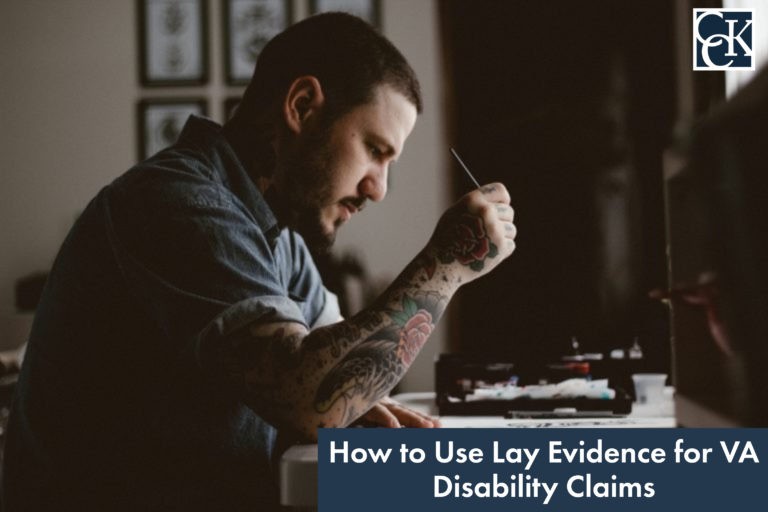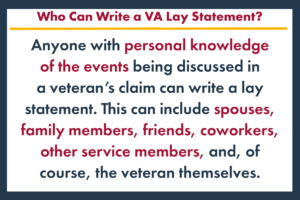How to Use Lay Evidence for VA Disability Claims

What Is a Lay Statement?
Lay evidence refers to personal statements for a VA claim written by a veteran or someone familiar with the veteran’s situation. Lay evidence, also known as lay statements or buddy statements, can be valuable in proving a VA claim or appeal for disability benefits.
A lay statement is used to help strengthen a veteran’s case. If a veteran has information missing from treatment records or service records, lay statements can be used to fill in the gaps. Lay evidence can also offer a better illustration the veteran’s current medical situation.
Types of VA Lay Evidence
In a claim or appeal for service connection, veterans can use lay evidence to describe the in-service event, injury, or illness that caused their disability. Lay evidence can also support a claim or appeal for an increased rating by detailing the veteran’s symptoms, their severity, and their progression over time.
Here are a few examples of how to use lay evidence:
- A personal statement: lay evidence written by the veteran detailing their personal experience during and after service.
- A buddy letter: lay evidence written by a fellow service member who witnessed the in-service event.
- A spousal letter: lay evidence detailing the veteran’s daily struggles with their service-related disability and/or the progression of their condition.
- A statement from a co-worker: lay evidence demonstrating the veteran’s inability to work due to their service-related condition. This is especially helpful in claims for Total Disability based on Individual Unemployability (TDIU).
Who Can Write a VA Lay Statement?
Anyone with personal knowledge of the events being discussed in a veteran’s claim can write a lay statement. This can include spouses, family members, friends, coworkers, other service members, and, of course, the veteran themselves.
Those writing lay statements should explain what they have personally observed or witnessed about the veteran’s condition, daily life, or the in-service event that occurred. They should always sign and date the document and indicate how and why they have personal knowledge about the veteran’s situation. For example, a spouse completing a lay statement for a veteran’s claim should mention the length of time they have been married and/or living together. Following these steps will help to ensure VA finds the statement credible.

How to Submit a Lay Statement VA Form
As of January 17, 2021, the U.S. Department of Veterans Affairs (VA) requires that lay evidence be submitted using VA Form 21-10210. This form contains the following sections:
- Identifying the veteran
- Claimant information (if the claimant is not the veteran)
- The written statement
- The layperson’s contact information (e.g., phone number, email address, mailing address)
- A section to certify and sign the statement
If you run out of space for your statement in Section III, you can attach an addendum, or additional papers, to continue your statement. Veterans should be sure to note on the form that an addendum is attached if they are submitting any additional papers.
If more than one person is submitting lay evidence on your behalf, each person will have to fill out a separate VA Form 21-10210.
How Effective is Lay Evidence?
A VA lay statement can be very effective in proving some elements of a claim, but ineffective in others.
For example, lay statements can be particularly helpful in providing details for a post-traumatic stress disorder (PTSD) claim. A personal statement allows veterans to share their struggles where medical records cannot. Similarly, a buddy statement can be quite effective for corroborating a PTSD stressor.
On the other hand, lay statements are usually not effective when establishing a medical nexus between the veteran’s current disability and military service. If the layperson is not a doctor, they cannot determine a link between the condition and in-service event because they lack the expertise to make that judgment.
Overall, while lay evidence cannot take the place of medical records, it can be key to proving a VA disability claim. Favorable and relevant lay evidence must be considered by VA when adjudicating a claim.

Tips for Writing a Competent and Credible Lay Statement
For VA to consider lay evidence, it must be deemed competent and credible.
Competency refers to the knowledge of the individual completing the statement. As previously mentioned, anyone who prepares a lay statement for a veteran must have personal knowledge of what is being discussed. Credibility speaks to the reliability of what is being said in the statement.
Common Mistakes that Reduce Credibility
If VA finds inconsistencies in lay statements, the credibility of the veteran may be at risk.
Inconsistencies can occur for several reasons. For example, a veteran may detail events from decades ago in several lay statements and include different dates in each one.
To avoid such inconsistencies, veterans can offer more general time frames. For instance, instead of providing a specific date for an event, veterans can explain that it happened during the summer, or between 1970 and 1971. Veterans can also give a more general view of the events if they simply do not remember and can mention that fact in their lay statement.
It is important to never exaggerate or downplay your condition when writing a lay statement. Be truthful and consistent in all your statements and avoid “all or nothing” terminology.
What to Do if VA Determines Lay Evidence Is Not Credible or Competent
If VA determines that a lay statement is not credible, the veteran can respond with another lay statement to clarify what was written or submit a statement from another person.
For example, if VA noticed inconsistent dates mentioned across lay statements, the veteran can respond by explaining that they do not remember the exact dates and perhaps provide some context, such as the season during which an event occurred. Always be honest in your lay statements.
If VA questions the competence of a layperson, the veteran can submit a lay statement explaining how that person has enough personal knowledge of the subject matter to make their statement.
VA Personal Statement Examples
For your reference, find examples of VA buddy letters below:
Please note that these are merely examples and should not be submitted in support of any claim for VA disability benefits. This information is not legal advice and has been made available for educational purposes to provide veterans, their families, and friends a general understanding of how these statements should be drafted.
Need Help with Your VA Lay Statement?
The accredited veterans’ advocates at Chisholm Chisholm & Kilpatrick LTD have years of experience helping veterans write and obtain successful lay statements. If VA denied your claim for disability benefits, the team at CCK may be able to help you submit a lay statement as part of an appeal.
Reach out to CCK today for a free case evaluation.
About the Author
Share this Post

